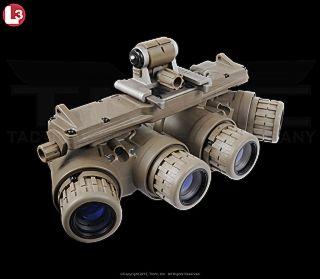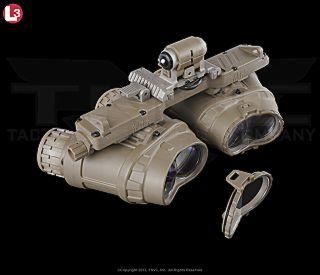L-3 GPNVG-18 - ANVIS Ground Panoramic Night Vision Goggle
Milford, NJ
Email to place order & for pricing
Available to U.S. Military and Law Enforcement ONLY
L-3 Warrior Systems, the night vision division of L-3, has developed and fielded one of the biggest innovations in night vision technology with the Ground Panoramic Night Vision Goggle (GPNVG-18). The purpose of the GPNVG-18 is to provide the operator more information under goggles, allowing him to more quickly move through the OODA Loop (Observe, Orient, Decide, Act). The most striking feature of the GPNVG-18 is the presence of four separate image intensifier tubes with four separate objective lenses arrayed in a panoramic orientation. The center two lenses point forward like traditional dual-tube goggles, giving the operator more depth perception, while two more tubes point slightly outward from the center to increase peripheral view. The two tubes on the right and the two on the left are spliced at the eyepieces. The operator sees the two center tubes somewhat overlapping the two outer tubes to produce an unprecedented 97° FOV. This is an absolute game-changer for the SOF community. The two right and two left tubes are housed in merged assemblies and are hung from a bridge similar to ANVIS goggles, giving operators interpuplliary adjustment options. They can also be easily removed and operated as independent handheld viewers. The Bridge assembly features fore/aft adjustment on a ratchet system and can come configured from the factory in two different variants for different helmet mount setups: Ball Detent (ANVIS) or Dovetail (BNVS).
The GPNVG-18 is powered by a remote battery pack, tethered to the unit via a standard ANVIS cable. It comes with a pack that accepts four 3-Volt CR123A batteries that tend to power the unit for about thirty hours (in my trial). The GPNVG-18 can be powered for a shorter amount of time if mounted in the Wilcox Panoramic Mount designed for a specific military unit. The remote battery pack provides a secondary function as a counterweight, which is needed considering the goggle weighs about 27 ounces.
System adjustment and placement is key in providing the best image to the operator. One of the main adjustments for focus in a night vision goggle is the diopter. Diopter focus adjustment is traditionally achieved by rotating a diopter focus ring. This adjusts focus of the goggle as it is in relation to the individual wearer’s eye(s). The challenge presented by the panoramic lens assembly of the GPNVG-18 is that the rear lenses are “fused” together, almost like a prism. This is what gives the operator the overlapping images from the forward and angled tubes. But, it also keeps the goggles from being able to have diopter rings for focus. So, the diopter adjustments are done with interchangeable diopter windows that stand off the lens. The kit comes with various windows that clip onto the rear lens housings and range from +0.5 to -2.5. So, the operator must ensure adjustments are made prior to going outside the wire because doing so in the field requires the other adjustment windows to be carried along.
The GPNVG-18 utilizes commercially-available Gen3 18mm MX-10160 image intensifier tubes, which are the same as used by ANVIS goggles. These tubes are good for maintenance because they use L3’s solder-free replaceable tube design. This is a very welcome feature since the modular L3 tubes do not require a whole operation to replace. Some quick work with common tools, and the tube replacement is done. In fact, the entire goggle has been designed with maintenance in mind. One of the biggest issues with NVG’s (and just about any highly technical device) is maintenance of damaged/non-functioning equipment. This is often a lengthy process that requires a unit to be without equipment for a while because devices require specialty tools and facilities for repair. The GPNVG-18’s have a totally modular chassis with a fully serviceable bridge.
Using the GPNVG-18 is a very unique experience. For someone who has grown accustomed to the narrow FOV of standard goggles, the night looks completely different with 97°. There is no loss of visual acuity in the outer channels, so image looks as crisp in the widest parts as it does in the traditional “zone 1.” There is a slight wave of blocked image in the overlap, but it is minor and you only “see” an overlap of three images since your brain melds the two center tubes (just like any binocular system). After wearing the goggle for about five minutes, your brain does not even see the slight black semi-circle where the overlap occurs.
The GPNVG-18 is representative of pure out-of-the-box thinking. While they are not using any of the new “groundbreaking” fusion technology or jacking you into a satellite feed, the simple fact that they allow the operator to see more is a godsend. After all, NVG’s are there to allow you to see at night. So, the more you see, the better off you are. It is as simple as that. These goggles give the operator the ability to do more while using the same visual FOV he has during the day, at night. The GPNVG-18 is an extraordinary development in night vision application, giving the modern Warfighter more combat options and increasing his lethality.
Export of Night Vision Equipment or related accessories (such as manuals) is strictly regulated by the US Department of State in accordance with the guidelines of the International Traffic in Arms Regulations (ITAR). It is a major crime to ship or carry US manufactured night vision devices outside the borders of the United States, punishable by fines and prison sentences. Ignorance of these regulations will not hold up in court. By purchasing night vision equipment from TNVC, you attest that you will not attempt to export or carry this night vision equipment outside the borders of the United States. Also, it illegal to allow a non-US Citizen to look through US Gen3 Night Vision Devices, even on US soil. Again, this is a crime punishable by fines and prison sentences.
Posted Thursday, Apr 18 2019
Approximation to protect seller's privacy

